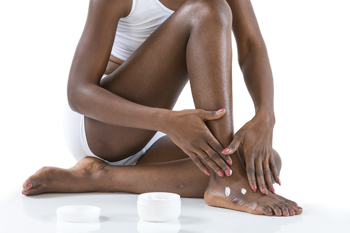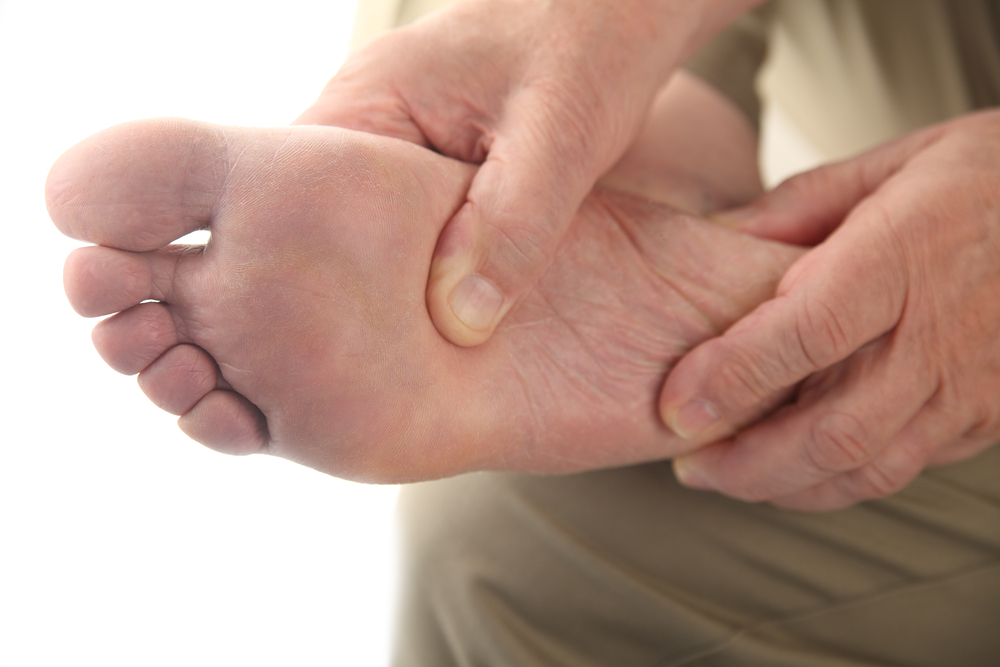Items filtered by date: April 2021
How Feet May Show Early Warning Signs of Diabetes
According to The National Diabetes Statistics Report of 2020, over 34 million Americans over the age of 18 had diabetes in 2018. However, 7.3 million of those people were either not aware they had diabetes or did not report it. It is important to be properly diagnosed and treated for diabetes promptly as this chronic disorder causes elevated blood sugar levels which can lead to several negative health conditions throughout the body—including diabetic foot problems due to poor circulation and nerve damage. Your feet can often present warning signs of diabetes such as numbness in your toes or feet, tingling, burning, swelling, lack of feeling, or change of skin color in your feet, open sores that won’t heal, ankle pain, and more. If you notice any of these symptoms or are experiencing any pain in your feet or ankles, it is suggested that you contact a podiatrist for a thorough examination and proper diagnosis.
Diabetic foot care is important in preventing foot ailments such as ulcers. If you are suffering from diabetes or have any other concerns about your feet, contact one of our podiatrists from Pennsylvania. Our doctors can provide the care you need to keep you pain-free and on your feet.
Diabetic Foot Care
Diabetes affects millions of people every year. The condition can damage blood vessels in many parts of the body, especially the feet. Because of this, taking care of your feet is essential if you have diabetes, and having a podiatrist help monitor your foot health is highly recommended.
The Importance of Caring for Your Feet
- Routinely inspect your feet for bruises or sores.
- Wear socks that fit your feet comfortably.
- Wear comfortable shoes that provide adequate support.
Patients with diabetes should have their doctor monitor their blood levels, as blood sugar levels play such a huge role in diabetic care. Monitoring these levels on a regular basis is highly advised.
It is always best to inform your healthcare professional of any concerns you may have regarding your feet, especially for diabetic patients. Early treatment and routine foot examinations are keys to maintaining proper health, especially because severe complications can arise if proper treatment is not applied.
If you have any questions please feel free to contact one of our offices located in Plymouth Meeting and Ambler, PA . We offer the newest diagnostic and treatment technologies for all your foot and ankle needs.
Heel Pain Can Be Treated!
What Can I Eat if I Have Gout?
 Gout is a type of arthritis that is caused by a buildup of uric acid in the bloodstream. When uric acid deposits in the joints, it crystallizes and causes symptoms such as pain, swelling, and inflammation. Gout frequently affects the joints of the feet, and specifically the big toe joint. This condition can sometimes be managed by modifying your diet. Foods that are high in purines, such as red meat, can cause the body to produce more uric acid. Therefore, their consumption should be limited. Instead, opt for foods that are low in purines, such as green vegetables, fruits, nuts, dairy products, and eggs. If you experience frequent gout flare ups, please consult with a podiatrist who can help treat and manage this condition.
Gout is a type of arthritis that is caused by a buildup of uric acid in the bloodstream. When uric acid deposits in the joints, it crystallizes and causes symptoms such as pain, swelling, and inflammation. Gout frequently affects the joints of the feet, and specifically the big toe joint. This condition can sometimes be managed by modifying your diet. Foods that are high in purines, such as red meat, can cause the body to produce more uric acid. Therefore, their consumption should be limited. Instead, opt for foods that are low in purines, such as green vegetables, fruits, nuts, dairy products, and eggs. If you experience frequent gout flare ups, please consult with a podiatrist who can help treat and manage this condition.
Gout is a foot condition that requires certain treatment and care. If you are seeking treatment, contact one of our podiatrists from Pennsylvania. Our doctors will treat your foot and ankle needs.
What Is Gout?
Gout is a type of arthritis caused by a buildup of uric acid in the bloodstream. It often develops in the foot, especially the big toe area, although it can manifest in other parts of the body as well. Gout can make walking and standing very painful and is especially common in diabetics and the obese.
People typically get gout because of a poor diet. Genetic predisposition is also a factor. The children of parents who have had gout frequently have a chance of developing it themselves.
Gout can easily be identified by redness and inflammation of the big toe and the surrounding areas of the foot. Other symptoms include extreme fatigue, joint pain, and running high fevers. Sometimes corticosteroid drugs can be prescribed to treat gout, but the best way to combat this disease is to get more exercise and eat a better diet.
If you have any questions please feel free to contact one of our offices located in Plymouth Meeting and Ambler, PA . We offer the newest diagnostic and treatment technologies for all your foot and ankle needs.
What Can Cause an Ingrown Toenail to Develop?
 An ingrown toenail is a common foot condition that affects millions of people worldwide. It happens when the outer edge of the nail grows into the skin. This can occur for a variety of reasons consisting of genetic factors, wearing shoes that do not have adequate room for the toes to move freely in, or possibly from toenails that are shaped abnormally. Additionally, trimming the toenails incorrectly may cause ingrown toenails to develop. Some of the symptoms that are associated with this ailment can include redness and tenderness surrounding the affected nail, and in severe cases, there may be a discharge coming from the nail. Research has indicated that diabetic patients may be prone to developing ingrown toenails, in addition to patients that have poor circulation. If you would like more information about how to treat and prevent ingrown toenails, please schedule an appointment with a podiatrist.
An ingrown toenail is a common foot condition that affects millions of people worldwide. It happens when the outer edge of the nail grows into the skin. This can occur for a variety of reasons consisting of genetic factors, wearing shoes that do not have adequate room for the toes to move freely in, or possibly from toenails that are shaped abnormally. Additionally, trimming the toenails incorrectly may cause ingrown toenails to develop. Some of the symptoms that are associated with this ailment can include redness and tenderness surrounding the affected nail, and in severe cases, there may be a discharge coming from the nail. Research has indicated that diabetic patients may be prone to developing ingrown toenails, in addition to patients that have poor circulation. If you would like more information about how to treat and prevent ingrown toenails, please schedule an appointment with a podiatrist.
Ingrown toenails can become painful if they are not treated properly. For more information about ingrown toenails, contact one of our podiatrists of Pennsylvania. Our doctors can provide the care you need to keep you pain-free and on your feet.
Ingrown Toenails
Ingrown toenails occur when a toenail grows sideways into the bed of the nail, causing pain, swelling, and possibly infection.
Causes
- Bacterial infections
- Improper nail cutting such as cutting it too short or not straight across
- Trauma to the toe, such as stubbing, which causes the nail to grow back irregularly
- Ill-fitting shoes that bunch the toes too close together
- Genetic predisposition
Prevention
Because ingrown toenails are not something found outside of shoe-wearing cultures, going barefoot as often as possible will decrease the likeliness of developing ingrown toenails. Wearing proper fitting shoes and using proper cutting techniques will also help decrease your risk of developing ingrown toenails.
Treatment
Ingrown toenails are a very treatable foot condition. In minor cases, soaking the affected area in salt or antibacterial soaps will not only help with the ingrown nail itself, but also help prevent any infections from occurring. In more severe cases, surgery is an option. In either case, speaking to your podiatrist about this condition will help you get a better understanding of specific treatment options that are right for you.
If you have any questions please feel free to contact one of our offices located in Plymouth Meeting and Ambler, PA . We offer the newest diagnostic and treatment technologies for all your foot and ankle needs.
Four Tips for Healthy Feet
 Your feet carry you throughout your life, supporting the weight of your body. Maintaining the health of your feet is essential and there are many simple ways to keep the feet healthy. Check your feet regularly for any abnormalities, such as cracks, cuts, scrapes, sores, or discoloration. If caught early, most foot problems can be promptly and effectively treated by a podiatrist. Visually checking your feet is especially important if you have medical conditions like diabetes, poor circulation, or peripheral neuropathy, as you may not feel or notice an injury until it has progressed significantly. Keep your feet clean by washing them with soap and water and drying them thoroughly, especially in the area between the toes. Wear shoes that fit comfortably and trim your toenails regularly. For more information about everyday foot care, please speak with a podiatrist.
Your feet carry you throughout your life, supporting the weight of your body. Maintaining the health of your feet is essential and there are many simple ways to keep the feet healthy. Check your feet regularly for any abnormalities, such as cracks, cuts, scrapes, sores, or discoloration. If caught early, most foot problems can be promptly and effectively treated by a podiatrist. Visually checking your feet is especially important if you have medical conditions like diabetes, poor circulation, or peripheral neuropathy, as you may not feel or notice an injury until it has progressed significantly. Keep your feet clean by washing them with soap and water and drying them thoroughly, especially in the area between the toes. Wear shoes that fit comfortably and trim your toenails regularly. For more information about everyday foot care, please speak with a podiatrist.
Everyday foot care is very important to prevent infection and other foot ailments. If you need your feet checked, contact one of our podiatrists from Pennsylvania. Our doctors can provide the care you need to keep you pain-free and on your feet.
Everyday Foot Care
Often, people take care of their bodies, face and hair more so than they do for their feet. But the feet are a very important aspect of our bodies, and one that we should pay more attention to. Without our feet, we would not be able to perform most daily tasks.
It is best to check your feet regularly to make sure there are no new bruises or cuts that you may not have noticed before. For dry feet, moisturizer can easily be a remedy and can be applied as often as necessary to the affected areas. Wearing shoes that fit well can also help you maintain good foot health, as well as making it easier to walk and do daily activities without the stress or pain of ill-fitting shoes, high heels, or even flip flops. Wearing clean socks with closed shoes is important to ensure that sweat and bacteria do not accumulate within the shoe. Clean socks help to prevent Athlete’s foot, fungi problems, bad odors, and can absorb sweat.
If you have any questions please feel free to contact one of our offices located in Plymouth Meeting and Ambler, PA . We offer the newest diagnostic and treatment technologies for all your foot and ankle needs.


